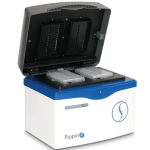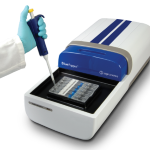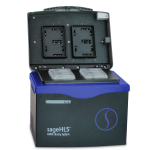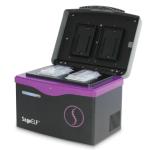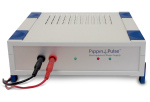Subspecies delineation amid phenotypic, geographic and genetic discordance in a songbird
February 2017
Authors:
Jennifer Walsh, Irby J. Lovette, Virginia Winder, Chris S. Elphick, Brian J. Olsen, Gregory Shriver, and Adrienne I. Kovach
Info:
Scientists at Cornell University and other institutions analyzed sparrow populations using reduced-representation sequencing to understand the genetic differences underlying a very broad range of phenotypes. They found that genetic data indicated three distinct clusters corresponding to habitat. The team used BluePippin to select 400 bp – 700 bp fragments for sequencing.
Citation:
Molecular Ecology
DOI: 10.1111/mec.14010
Small genomic insertions form enhancers that misregulate oncogenes
February 2017
Authors:
Brian J. Abraham, Denes Hnisz, Abraham S. Weintraub, Nicholas Kwiatkowski, et al.
Info:
In this paper, scientists report using ChIP-seq to better understand the role of non-coding somatic insertions in tumorigenesis. They identified enhancer-associated small insertions, often near oncogenes. Pippin Prep was used in the ChIP-seq protocol to capture 200 bp – 400 bp fragments ahead of sequencing on an Illumina HiSeq 2500.
Citation:
Nature Communications
doi:10.1038/ncomms14385
Minimum sample sizes for population genomics: an empirical study from an Amazonian plant species
February 2017
Authors:
Alison G. Nazareno, Jordan B. Bemmels, Christopher W. Dick, Lúcia G. Lohmann
Info:
Scientists in Michigan and São Paulo, Brazil, performed ddRAD-seq on two separate populations of Amphirrhox longifolia to determine how many SNPs and organisms have to be included for a well-powered study. By resampling the data, they determined that only eight individuals are necessary for studies with at least 1,000 SNPs. The team used Pippin Prep to size fragments for sequencing.
Citation:
Molecular Ecology Resources
DOI: 10.1111/1755-0998.12654
Genetic diversity of Atlantic Bluefin tuna in the Mediterranean Sea: insights from genome-wide SNPs and microsatellites
February 2017
Authors:
Aglaia Antoniou, Panagiotis Kasapidis, Georgios Kotoulas, Constantinos C. Mylonas and
Antonios Magoulas
Info:
Scientists from the Hellenic Centre for Marine Research used ddRAD-seq to analyze genome-wide SNPs in the Atlantic Bluefin tuna, with the goal of understanding population structure. Results were inconclusive, suggesting the need for further study. The team used Pippin Prep for the ddRAD-seq protocol.
Citation:
Journal of Biological Research-Thessaloniki
DOI: 10.1186/s40709-017-0062-2
Co-chaperone Hsp70/Hsp90 organizing protein (Hop) is Required for Transposon Silencing and piRNA Biogenesis
February 2017
Authors:
Joseph A. Karam, Rasesh Y. Parikh, Dhananjaya Nayak, David Rosenkranz and Vamsi K. Gangaraju
Info:
Scientists from South Carolina and Mainz, Germany, studied Hop, a co-chaperone that interacts with a piRNA in Drosophila. They found that knocking down Hop activates transposons and that it has an important role in maintaining genome integrity. RNA-seq was performed on an Illumina HiSeq 2500 after Pippin Prep was used for size selection.
Citation:
Journal of Biological Chemistry
doi: 10.1074/jbc.C117.777730
